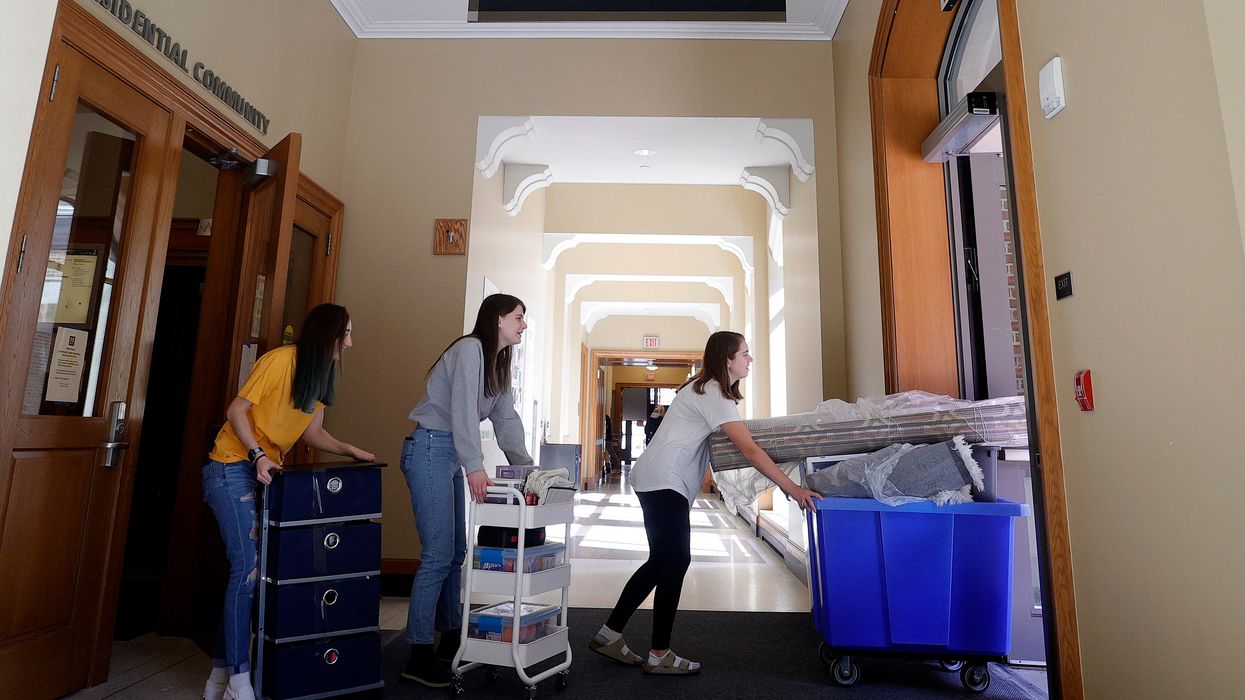College students were once hailed as a crucial voting bloc in 2020, but their momentum may be halted by the coronavirus pandemic that has shuttered campuses from coast to coast.
Registration drives, absentee ballot parties, political forums and new voter trainings are all on hold. Students are scrambling to chase down absentee ballot forms that were mailed to campuses but must now be forwarded to a home or other address. Newly designated campus polling places will stand empty for the remaining primaries, several of which have been delayed in any case. And students who return this fall will have little time to prepare for Election Day.
Even before the Covid-19 outbreak, college voters were having a rough year. Their preferred candidate, Sen. Bernie Sanders of Vermont, was proving incapable of reversing former Vice President Joe Biden's commanding lead in the Democratic presidential primaries. Republicans have erected roadblocks to student voting in Florida, New Hampshire, Texas and elsewhere — including residency requirements and restrictions on early voting, campus polling places and the use of student IDs for voting.
But the coronavirus is the wild card that now threatens student voting power most directly. It's a sudden reversal of fortunes for a fast-growing movement to expand campus voting that had, until now, seemed unstoppable.
College and university students, who number some 20 million nationwide, more than doubled their turnout between 2014 and 2018, from 19 percent to 40 percent, according to Tufts University research. And voters younger than 35 are emerging as the nation's largest voting bloc.
Surging youth activism has been fueled by President Trump's election and by younger voters' concerns over climate change, gun violence and other issues — helping to spawn dozens of new groups to boost student voting since 2016. More than 400 organizations, both on and off campuses, belong to a Students Learn Students Vote Coalition that promotes student voting and civic engagement.
These include the All In Campus Democracy Challenge, which gives awards to colleges and universities that boost voting rates, and the Campus Vote Project, which works with administrators, faculty, students and election officials to eliminate barriers to student voting. A subgroup of coalition partners that includes MTV and the Alliance for Youth Organizing has launched a "+1 The Polls"movement to open dozens of new, on-campus voting locations around the country.
Now leaders of the campus democracy movement are scrambling to regroup amid the broader challenge of moving all college and university classes, seminars and exams online.
On a group Twitter chat hosted Wednesday by the coalition, groups including the Student PIRGs and the Alliance for Youth Action described a massive shift from field organizing to digital organizing using all the available tools — from telephone calls and text messages to tweet banks and Instagram takeovers to Zoom video chats and virtual town halls.
Participants brainstormed ways to update students on the shifting primary and absentee voting landscape, and stressed the need to keep things fun with pop culture trends, dance memes and remote get-togethers, such as the "Couch Party" hosted this week by the nonprofit When We All Vote to text eligible voters.
But if voter suppression efforts succeed by making voting inconvenient, but a global pandemic is "the ultimate inconvenience," says Nancy Thomas, director of the Institute for Democracy & Higher Education at Tufts' Jonathan M. Tisch College of Civic Life. "We are all stuck in our homes. We are all socially distancing ourselves. And voting is a social act. People vote because their friends vote. People vote in packs."
Thomas and her team are urging educators and allies to spend the coming weeks figuring out how to engage potential student voters while they are off campus. This includes addressing both technical and motivational hurdles to voting.
Students need help with tactical questions about voter registration, absentee ballots, and whether to vote near campus or home. But the most successful campuses also help students to engage in and navigate political conversations, says Thomas. Like many civic educators, she sees the pandemic as a teachable moment.
"They should create opportunities for conversations, discussions about political issues that can be held online. They should be teaching about civic responsibility in the age of a crisis," says Thomas. "This virus presents an amazing learning opportunity on why partisanship in policy making can be so devastating."
Every Vote Counts, a student-led voter turnout group that has 50 chapters, contacts and partners around the country, is urging its student organizers to "really hit their administrative and faculty contacts now" to gear up for fall, says the group's executive director, Campbell Streator. The primaries are important, and several still lie ahead in such college-campus-rich states as Connecticut, Pennsylvania, New York and Wisconsin.
But the group's real focus is on the general election, says Streator, when colleges will have just a few crucial touch-points — student orientation, move-in days, required classes — to prepare students for voting in the short weeks before Election Day. The goal, he says, will be "making sure that every student when they come back to campus in the fall is asked: Are you registered? Do you want to register?"
Variables that will affect student turnout include whether they live in states that vote entirely by mail — Colorado, Oregon, Washington, Utah and Hawaii — or in states with no-excuse absentee voting, such as Arizona, Florida and Georgia. Another factor will be how well Democrats and voting rights advocates succeed in their recent push to expand voting by mail.
The pandemic has upended voting for everyone. But for students, says Streator, it throws "an additional unknown, or an additional hurdle, into an already complicated process."
Carney is a contributing writer.




















